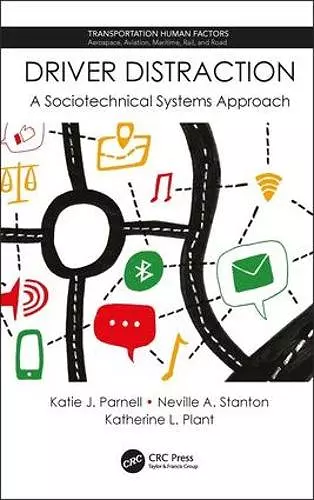Driver Distraction
A Sociotechnical Systems Approach
Neville A Stanton author Katherine L Plant author Katie J Parnell author
Format:Hardback
Publisher:Taylor & Francis Ltd
Published:26th Nov '18
Currently unavailable, and unfortunately no date known when it will be back

Driver Distraction: A Sociotechnical Systems Approach promotes a sociotechnical systems approach to driver distraction. This perspective focuses on analysis of the whole system, its values, and the interactions between human and technical elements at all organisational levels. The book covers the role that the sociotechnical system plays in the theory, study and mitigation of driver distraction. The book will be of interest to accident and incident investigation researchers and practitioners.
- Provides a review of the current state of driver distraction research
- Describes the development, application, and validation of a novel model of driver distraction that accounts for the sociotechnical system
- Discusses a new, systems-based, driver distraction definition
- Explains AcciMap analysis of the current legislation on driver distraction from technological devices
- Offers novel approaches to understanding why driver distraction occurs
- Presents a extensive framework of the causal factors that lead to distraction informed by drivers <
"This book provides a fresh perspective on the persistent problem of driver distraction by breaking the fixation on individual drivers and the devices that distract them. Adopting a sociotechnical perspective to distraction reveals novel solutions that have so far eluded the field. An extremely useful resource for designers, engineers, researchers, accident investigators, regulators and policy makers."
— Professor John D Lee, University of Wisconsin–Madison, USA
"This book takes a new approach to the problem of driver distraction. The sociotechnical systems perspective helps us understand that driver distraction is not just due to human error - but is created unwittingly by international and national committees, governments and regulators, as well as manufactures of vehicles and nomadic devices. This is an important book for researchers and practitioners wishing to understand the latest thinking on driver distraction. It gives a refreshing theoretical perspective on a critical problem, together with practical solutions. A must read for anyone working in this domain."
— Professor Gary Burnett, University of Nottingham, UK
"Parnell, Stanton and Plant bring a fresh, sociotechnical, perspective to the study of driver distraction from technological devices, providing a new way of studying distraction with respect to the wider context within which it occurs, as well as the identification of other actors within the environment that influence it. This important book provides new theoretical, methodological and practical contributions to the field of driver distraction that will help to save lives. Highly recommended reading for all those working in this important field of endeavour"
— Professor Michael Regan, University of New South Wales, Australia
"This book provides a fresh perspective on the persistent problem of driver distraction by breaking the fixation on individual drivers and the devices that distract them. Adopting a sociotechnical perspective to distraction reveals novel solutions that have so far eluded the field. An extremely useful resource for designers, engineers, researchers, accident investigators, regulators and policy makers."
— Professor John D Lee, University of Wisconsin–Madison, USA
"This book takes a new approach to the problem of driver distraction. The sociotechnical systems perspective helps us understand that driver distraction is not just due to human error - but is created unwittingly by international and national committees, governments and regulators, as well as manufactures of vehicles and nomadic devices. This is an important book for researchers and practitioners wishing to understand the latest thinking on driver distraction. It gives a refreshing theoretical perspective on a critical problem, together with practical solutions. A must read for anyone working in this domain."
— Professor Gary Burnett, University of Nottingham, UK
"Parnell, Stanton and Plant bring a fresh, sociotechnical, perspective to the study of driver distraction from technological devices, providing a new way of studying distraction with respect to the wider context within which it occurs, as well as the identification of other actors within the environment that influence it. This important book provides new theoretical, methodological and practical contributions to the field of driver distraction that will help to save lives. Highly recommended reading for all those working in this important field of endeavour"
— Professor Michael Regan, University of New South Wales, Australia
"On the whole, this is an excellent and rigorous description of the application of systems and sociotechnical thinking to develop a sophisticated approach to understanding a pervasive and often fatal phenomena. This book is a valuable companion not just to those who’s research and practice includes the problem of driver distraction. In this reviewer’s opinion, it also serves as an excellent example of how to systematically apply systems thinking to a field where it is necessary but not yet embedded. Complex systems are nothing new (in fact, there are few things older), however our ability to investigate these is relatively recent because the scale of relationships involved and the emergent properties of these are beyond our comprehension without computer modeling. The challenge for contemporary researchers is to update what we think we know based on decades, and perhaps in some cases centuries, of research with new evidence that more closely reflects the reality of complex problems, such as driver behaviour. As a practical contribution to the central issue, the authors provide numerous recommendations with the aim of creating interactions between system components that reduce the likelihood that these create the conditions that support driver distraction."
ISBN: 9781138606814
Dimensions: unknown
Weight: 521g
250 pages